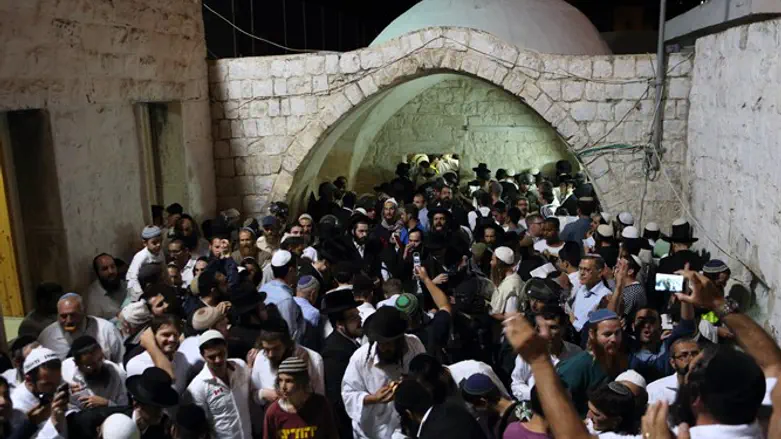
We have just read the concluding Torah portion of the book of Shemot which relates the final stages of construction and implementation of the Tabernacle. The culmination of its assembly is recorded as follows (Shemot 39:43):
“Moses saw the entire work, and lo! they had done it-as the Lord had commanded, so had they done. So Moses blessed them.”
What blessing did Moshe offer the Jewish people? The Torah is silent about it.
The Sages bring forth a potential elucidation of this blessing through a Midrash:
“So Moses blessed them: May it be Your will that the Divine Presence (Shechina) reside in the work of your hands. Another interpretation: May it be Your will that your enemy not gain control over the work of your hands, as the Tabernacles was hidden within the Temple.”
Let’s analyze each of these two blessings (which are formulated as prayers).
In the first, Moshe is requesting that the Shechina, the Divine Presence, reside within the Tabernacle. What kind of request is this? Why would he not think the Shechina would operate as God promised?
The second interpretation is more problematic. With the completion of the Temple, the Tabernacle no longer had any function, and was therefore hidden away. Why would Moshe focus on the possible assertion of control over the Tabernacle by any enemy?
The very idea of a Tabernacle presents as an epic philosophical task, one that on the surface sounds completely absurd. God is the Necessary Existence, Omniscient, Omnipotent, the Creator and King. Any descriptor cannot do justice to God. The assumption one can “localize” God into a place defies any logic. However, humans require an avenue of worship to God, and the construction of the Tabernacle was necessary to bring about this objective.
Introducing the idea of the Shechina resting within the Temple brings with it a host of potential philosophical problems and distortions. Among the dangers involved were notions of familiarity and accessibility to the Divine. Such a concept would be a serious violation of a foundational way in relating to God.
This overall feeling would be specifically manifest when the Tabernacle was finally assembled. The Jewish people were following the command of God in building the Tabernacle. Once completed, it would seem reasonable to assume that the Divine Presence would be “activated”. The connection with God would be the direct result of the final completion of the project. This is the very error that precipitated Moshe’s request.
Moshe was trying to teach a lesson through this unique appeal. The Jewish people should not believe that there would be a Divine result necessitated through the fabrication of the Tabernacle. In other words, God would not have to respond to the finalization of the Tabernacle. Such a conclusion would undermine the objectives tied to the Tabernacle. Humanity cannot force God’s hand.
The Sages express this sentiment in the daily prayer of Shemoneh Esreh, specifically in the final blessing concerning requests:
“Hear our voice, Lord our God, pity us and have mercy on us and receive in mercy and favor our prayer, for You are a God Who hears prayer and supplication. From Your Face, our King, do not turn us away empty handed, for You hear the prayers of Your people Israel in mercy. Blessed are You, O Lord, Who hears prayer.”
It is odd that after requesting all that we need from God, there is a separate prayer asking for God to listen those prayers just recited. Shouldn’t one assume that by virtue of the very enunciation of the previous prayers that God is listening?
The answer is an emphatic “No”. When we pray, we express the reality of how we are dependent existences. However, we cannot approach prayer as if there will be a definitive result. We cannot bind God to a response. Thus, we demonstrate that the most we can hope for is that we merit a response from God.
This idea can be found in Moshe’s blessing. One should not assume that a specific action ties God to a response. Rather, the merit of the Jews will determine the existence of the Divine presence among them.
What of the second blessing? While the Jewish people needed to understand that the Tabernacle was not infused with some type of magical power, our ideological enemies certainly would see them as intrinsically powerful. One of the crucial roles of the Tabernacle was the demonstration to the world (assuming it was merited) the idea of God’s relationship to humanity, and His unique one with the Jewish people. There was a sanctification of God to the world.
To allow those who reject Judaism to capture the Tabernacle would lead to the severest form of profaning God, and this needed to be avoided. Moshe understood the unique danger that would take place in the distortion of the Tabernacle, and therefore his prayer was to ensure the ideas surrounding the Tabernacle remain intact.
The blessing offered by Moshe could easily be seen as an afterthought, as the Torah never describes in any detail what he uttered. The Sages, though, explain that Moshe was teaching the Jewish people the final ideas required prior to the Tabernacle coming into service. In stressing this idea, the Sages remind us of the importance of not just the physical acts of worship to take place; rather, the Jewish people must have the correct philosophical relationship to God for it to function properly.